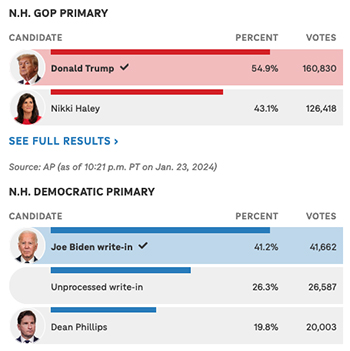By Jim Ellis — Friday, April 12, 2024
President
Cornel West: Chooses VP Running Mate — Independent presidential candidate Cornel West yesterday announced that California State University at Los Angeles professor and Black Lives Matter organizer Melina Abdullah will join his national ticket. Dr. West has qualified for the ballot in four states (AK, OR, SC, UT), but several domains require independent candidates to file with a vice presidential running mate.In addressing that Abdullah is a Muslim while West is a Christian, the presidential candidate said, “I’m running for Jesus. She’s running for Allah. That’s a beautiful thing.” A spokesman for the Democratic National Committee, Matt Corridoni, isn’t in agreement that the ticket is “a beautiful thing.” In response, he said, “The stakes are high, and we know this is going to be a close election — that’s why a vote for any third party candidate is a vote for Donald Trump.”
Minnesota: Another Close Poll Release — While the presidential map appears locked with only seven or eight states in play, one strongly Democratic entity continues to return close polling numbers. Should we continue to see two- to three-point spreads in ballot test results, Minnesota may soon enter the swing category.
The latest research release comes from Survey USA for ABC affiliate KSTP-TV Channel 5 in St. Paul (April 3-7; 608 likely Minnesota general election voters; online) and finds President Joe Biden holding only a 44-42 percent lead with 11 percent saying they would support another candidate.
This poll is not an anomaly. In fact, it is highly consistent with four other independent Minnesota surveys conducted in October, November, January, and February. In each of these five studies (three from Survey USA, and one from the Minnesota Post and Emerson College) the range between Biden and Trump during the six-month period spanned between just two and four percentage points with Biden leading in each survey. Therefore, expect Minnesota to be paid more attention as the national campaign progresses.
House
North Dakota-AL: Former Miss America Enters At-Large Cong Race — With the North Dakota Republican Party convention delegates not endorsing a congressional contender at last week’s official gathering, several more individuals entered the field just as candidate filing closed.
In addition to convention participants Julie Fedorchak and former state Rep. Rich Becker, 2018 Miss America Cara Mund, who ran for the seat as an Independent in 2022, retired military veteran and farmer Alex Balazs, and conservative activist Sharlet Mohr, will also compete in the at-large June 11 primary election.
The eventual Republican nominee will have the inside track toward claiming the open seat in the general election. Educator and military veteran Trygve Hammer is unopposed for the Democratic nomination. Incumbent Rep. Kelly Armstrong (R-Bismarck) is leaving the House to run for governor.
National
Pew Research Center: Partisan Political Study — The Pew Research Center released an exhaustive report on American political partisanship (released April 9, 2024; data collected between Aug. 7-27, 2023; compared with similar results from 1994-2023) and finds that the country is at basic parity between Democrats and Republicans. Asking people if they consider themselves Democrats or Republicans, or lean to one party or the other, 49 percent identified with the Democrats while 48 percent sided with the Republicans.
The coalition division is stark. Democrats fare best (in order of strength) with blacks, religiously non-affiliated, English speaking Asians, those born in the 1990s, Hispanics, urban residents, and women with a college degree. The support range is from a high of 83-12 percent (blacks) to 60-37 percent (women with a college degree).
For Republicans, the coalition order of strength includes white evangelical Protestants, Mormons, white voters without a college degree, veterans, residents of rural communities, white men, and those born in the 1940s. The support range reaches from 85-14 percent (white evangelical Protestants) to 54-43 percent (those born in the 1940s).







